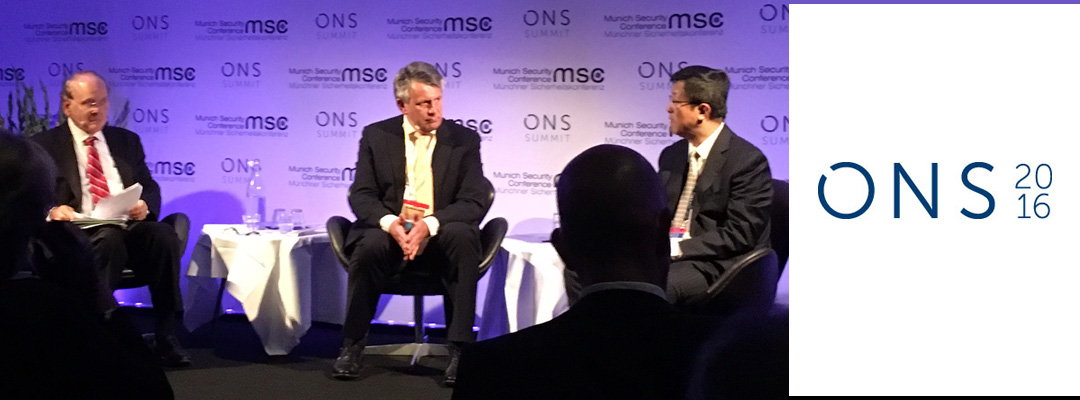ONS Summit 2016
Stavanger, Norway
IEF Secretary General, Dr Sun Xiansheng joined Ministers, senior officials and other experts on 29-30 August in Stavanger, Norway to participate in the ONS2016 Summit.
On 29 August Dr Sun participated in a high-level roundtable held under the Chatham House Rule and chaired by ONS President and CEO, Leif Johan Sevland and Munich Security Conference (MSC) Chairman Ambassador, Wolfgand Ischinger. Daniel Yergin moderated the meeting in which host-country Minister of Foreign Affairs, HE Børge Brende (MoFA) and Minister of Petroleum and Energy, HE Tord Lien also participated.
The subjects addressed during the course of the roundtable included energy security concerns arising from geopolitical tensions in Europe and the Middle-East, the effects of the current low oil price environment, and the potential consequences of the uncertainty that these issues and others create in markets that must also consider the implications of the recent Paris climate change pledges.
Several observers noted the fundamental disconnect between the aspirations of the Paris agreement and the realities imposed by current economic and social pressures. Others pointed out that although the outlooks from the IEA, OPEC and others concur that fossil fuels will likely still comprise over 75% of the global energy mix by 2040, the agreements reached in Paris point to an entirely different picture. Some observed that coupled with the effects of the current market overhang, the absence of cohesive and clearly communicated policy is testing the risk threshold of the energy industry and capital markets alike. They further noted that investment is already lagging far behind the requirements needed to support projected future demand curves.

On the subject of the elusive "golden age of gas", many around the table lamented the ongoing and seemingly counter-intuitive use of coal at the expense of the much cleaner alternative offered by gas. This sentiment was expressed most strongly in regard to Europe where the phenomenon was attributed in the main to economic and social pressures that encourage market behaviour that is at odds with policy-makers' strong advocacy for a low-carbon future.
The absence of Europe-wide gas receiving and distribution infrastructure was also noted by some as a limiting factor in the gas story, even as the potential for abundant and diverse supplies of LNG from Australia, USA and the Middle East seem to offer gas a golden opportunity to capture the market post-Paris. The power of infrastructure was illustrated by one participant who noted that even the act of building a single LNG import terminal capable of receiving seaborne supplies had exerted significant downward pressure on the price of pipeline-supplied gas.
Gas seemed to have widespread support around the table being cited more than once for its suitability as an ideal base-load agent and bridging fuel of choice. Examples given, included the significant reduction in US emissions attributed to the substitution of gas for coal to mid-90's levels on the one hand, and recent issues of intermittency in Australian renewable energy supplies on the other. The UK's policy of favouring gas over coal in regard to the replacement of coal-fired plants with ones powered by natural gas was welcomed as a bold and decisive step in the right direction by one participant. Another participant cited recent sales of gas from the USA to China and Kuwait as a success story motivated by economics rather than geopolitics.
In reference to calls from some participants for the removal of coal subsidies, others pointed out that in some countries, coal was not subsidised, but was nonetheless ‘king’ given its indigenous abundance and the economic realities of the coal price versus that of imported gas. Referencing earlier comments about the absence of comprehensive Europe-wide gas infrastructure interconnections as a stumbling block for gas penetration, one participant noted that India faced the same issue with poor gas links to inland demand centres.

There was a groundswell of support for the notion that the most pragmatic approach to ensuring energy security in an uncertain world is to diversify both the mix and the sources of supply. However, it was also noted that even this simple sounding solution is dependent on the availability of adequate and timely investment, and that this is unlikely to be forthcoming if risk levels are perceived to be too high or too volatile.
The following day Dr Sun and Shell CEO, Ben van Beurden took part in an ONS Summit panel moderated by Daniel Yergin and held in the presence of Norwegian Prime Minister, HE Erna Solberg, and the Norwegian Minister of Petroleum and Energy, HE Tord Lein. World Energy Council Secretary General, Dr Christoph Frei and Narendra Taneja, Energy Advisor to India’s ruling BJP Party also participated in this event. The IEF Secretary General stressed the importance of ongoing producer-consumer dialogue and cooperation (also with transit states) especially during times of uncertainty and high volatility. He further emphasised that governments should seek to build a balanced energy mix sourced from a diverse range of suppliers in order to satisfy both their aspirations for a sustainable energy future, and to protect their collective energy security.
Dr Sun and his team also engaged in several bi-lateral meetings with officials from the Norwegian Ministry of Foreign Affairs, and Ministry of Petroleum and Energy, as well as with the CEO of Statoil and representatives from think-tanks and academia.






